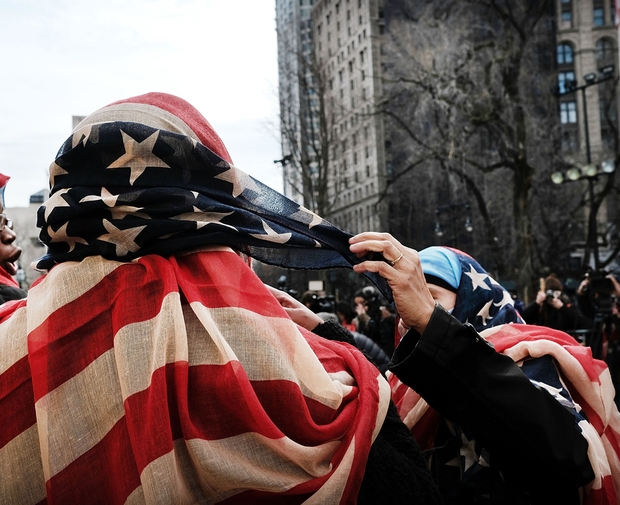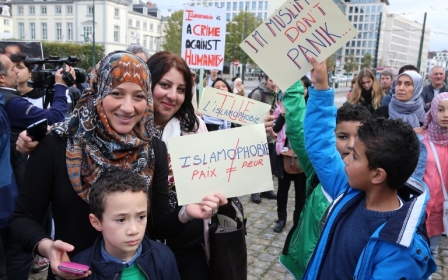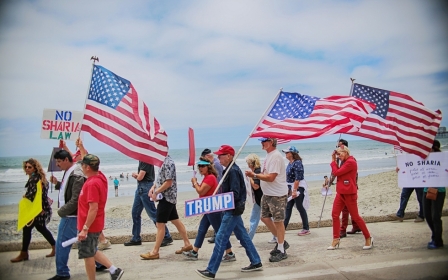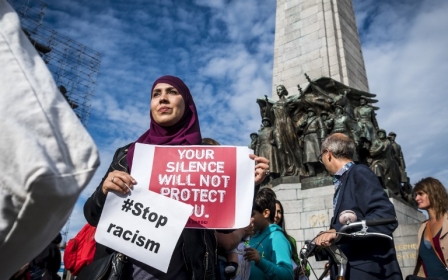Dozens of US mid-term candidates using anti-Muslim rhetoric, study shows

NEW YORK, United States – Eighty candidates running in the current electoral cycle in the United States have courted anti-Muslim voters in their bids to secure office, including many mainstream Republicans echoing US President Donald Trump, according to a new report.
The study, called Running on Hate and published by Muslim Advocates, a civil rights group, named Ted Cruz, Ron DeSantis, Scott Perry and other influential Republicans in its list of politicians who have taken anti-Muslim stances in their campaigns, ahead of mid-term elections on 6 November.
Cruz, a Texas senator, and DeSantis, who aims to be Florida’s next governor, have both addressed members of the anti-Islam group ACT for America, while Perry, a California congressman, erroneously linked a mass shooting in Las Vegas to the Islamic State (IS) group, the report says.
The 55-page study lists candidates across the US who have used anti-Muslim rhetoric, including a conspiracy theory that former President Barack Obama and the Muslim Brotherhood are in cahoots to replace the US constitution with Sharia law.
“This anti-Muslim rhetoric is widespread. It’s in every region of the country, conservative and liberal places. It’s every level of office, from school and planning boards up to governorships and congress,” the report's author, Scott Simpson, told Middle East Eye.
“Most of them are credible candidates, not just folks on the fringe of politics.”
Researchers also cited less publicised contests, including a Virginia congressional race in which Democrat Abigail Spanberger faced attack advertisements over her teaching job in a Saudi-funded Islamic school that opponents nicknamed “terror high”.
For our community, it’s very isolating, concerning and it creates an atmosphere of fear. But we also see signs of more people coming out to vote, and there’s a strong gust of empowerment over Texas right now.
-Sobia Siddiqui, CAIR-Houston
In California, Congressman Duncan Hunter released a 30-second commercial that depicted his Democratic challenger, Ammar Campa-Najjar, a Palestinian Mexican-American Christian, as a security risk who was bankrolled by the Muslim Brotherhood.
With only two exceptions, the 80 candidates named in the study were Republicans. Half of them sought seats in Congress, while the rest sought governor’s mansions or other statewide offices, seats in state legislatures or in municipal and county offices.
By and large, they would not be considered political outsiders or extremists, the report said: almost two-thirds of the candidates who promoted anti-Muslim conspiracies were incumbents, had previously held office or were backed by the White House.
They were present in 33 states, including left-leaning and urban states such as New York and Massachusetts. The states with the most anti-Muslim candidates were Texas with eight candidates and Virginia and Florida, with six each.
'Out of touch'
Sobia Siddiqui, from the Houston, Texas, branch of the Council on American-Islamic Relations (CAIR), said she was concerned by Republican candidates addressing anti-Muslim groups and stirring racial tensions to win votes.
“We’ve called Cruz out on his statements about surveying Muslim communities. It just makes you realise how out of touch some lawmakers can be from the people they represent,” Siddiqui told MEE.
“For our community, it’s very isolating, concerning and it creates an atmosphere of fear. But we also see signs of more people coming out to vote, and there’s a strong gust of empowerment over Texas right now.”
According to Simpson, bashing Muslims may not translate into election victories, either. While Trump won the White House in 2016 by pledging to ban Muslim travellers and other far-right immigration policies, the current crop of hardliners is faring poorly.
Of the 80 candidates mentioned in the report, many have already dropped out or lost in primary elections. Others, including Cruz and DeSantis, are in toss-up races. According to forecasts by the Cook Political Report, only between 11-14 percent are on track for safe wins on 6 November.
“The conventional wisdom that anti-Muslim rhetoric is popular is wrong,” added Simpson.
“These politicians - [who] are having their candidacies defined by their rhetoric - are withdrawing from races because of the backlash or losing their primaries. Candidates will lose their races because the vast majority of voters don’t like it.”
The US mid-term elections occur every four years, half-way through a president’s term, when all seats in the House of Representatives, a third of the Senate and other key posts are up for grabs.
New MEE newsletter: Jerusalem Dispatch
Sign up to get the latest insights and analysis on Israel-Palestine, alongside Turkey Unpacked and other MEE newsletters
Middle East Eye delivers independent and unrivalled coverage and analysis of the Middle East, North Africa and beyond. To learn more about republishing this content and the associated fees, please fill out this form. More about MEE can be found here.




